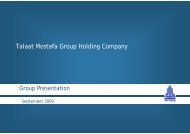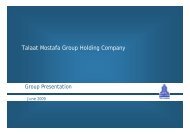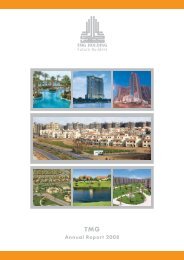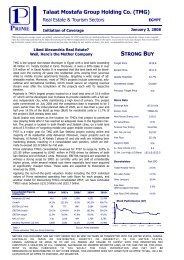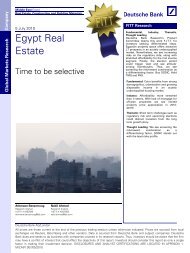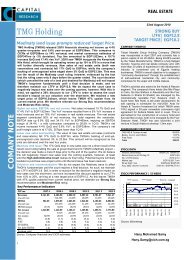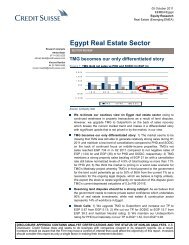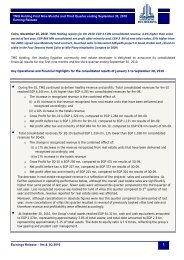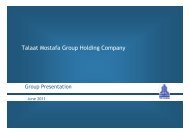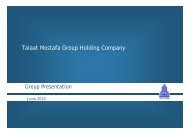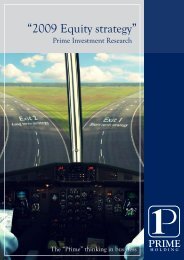Madinaty Master Plan - Talaat Moustafa Group
Madinaty Master Plan - Talaat Moustafa Group
Madinaty Master Plan - Talaat Moustafa Group
- No tags were found...
You also want an ePaper? Increase the reach of your titles
YUMPU automatically turns print PDFs into web optimized ePapers that Google loves.
operating cash flows or existing debt facilities, it may consider other means of financing its future plans, such as byaccessing the capital markets or incurring additional indebtedness.TMG may not be able to generate sufficient cash flows to fund capital investments for existing and futuredevelopment projects. In addition, it may face difficulties in obtaining debt financing, refinancing existing debt orraising capital from the capital markets due to reasons beyond its control, such as general economic conditions ofthe capital markets, or due to covenants under existing or future financing agreements. To date, TMG has beenexposed to relatively low amounts of debt in connection with the development of its properties. However, shouldTMG be able to obtain and use a higher amount of debt financing for future developments, the risks normallyassociated with debt financing, such as fluctuations in interest rates and increased interest expense, may affectTMG’s business. TMG’s failure to generate sufficient cash flows or to obtain the capitals required to financeinvestments in, or other liquidity requirements of, its existing development projects or its future growth plans couldhave an adverse effect on its business, financial condition and results of operations.Environmental problems are possible and can be costly.Environmental laws and regulations in Egypt have evolved over time, and are continuing to evolve. An owner oroccupier of real estate must investigate and clean up hazardous or toxic substances or petroleum products released ator affecting the property. Even if more than one person may have been responsible for the contamination eachperson covered by the environmental laws may be held responsible for all of the clean-up costs incurred. In addition,third parties may sue the owner or occupier of a site for damages and costs resulting from environmentalcontamination emanating from that site. As TMG’s real estate business grows and expands, and as environmentallaws continue to evolve, TMG may face increased risks relating to environmental contamination and protection inthe future.Under Egyptian law, environmental liabilities that occurred while land was owned by the State, that is, prior to theexecution of a preliminary sales contract, is the responsibility of the State. However, there can be no assurance thatthe law will not change or that it will prove possible to delineate and allocate responsibility for environmentalcontamination to the periods before and after the dates of land allocation contracts. If TMG were to be found liablefor any environmental contamination that occurred prior to the land being allocated to it, its business and results ofoperation could be impacted.Risks Relating to EgyptTMG is exposed to political, economic and legal risks in Egypt.Substantially all of TMG’s property developments, assets and operations are located in Egypt. As a result, TMG’soperating results are and will continue to be affected in general by economic, social and political developments in oraffecting Egypt and, in particular, by the level of economic activity in Egypt.The economy of Egypt, like those of many emerging markets, has been characterised by significant governmentinvolvement through direct ownership of enterprises and extensive regulation of market conditions, includingforeign investment, foreign trade and financial services. Despite the ongoing programme of deregulation, tradeliberalisation and privatisation, which began in the 1990s, the State continues to exercise a significant influenceover many aspects of the Egyptian economy. There can be no assurance that capital inflows will remain at recentlevels, or that the State will not have to increase interest rates or tighten the monetary supply in order to redressEgypt’s trade imbalances. Egypt continues to experience a high level of unemployment, a problem compounded bythe requirements of the State’s economic reform programme, which requires staffing in the public sector to bereduced. Egypt’s rapid population growth also remains a major problem for its economy. In addition, inflation ratesin Egypt, which have increased recently, could continue to rise in the future as a result of deficit financing, capitaloutflows and/or other economic factors.Some MENA countries have experienced in the recent past or are currently experiencing political, social andeconomic instability, extremism, terrorist acts and/or war. Within Egypt, extremists have engaged in a campaign,sometimes violent, against the State in recent years, and terrorists have struck civilian targets. On 26 March 2007, areferendum was held for voters to affirm certain constitutional amendments passed by Parliament, which wereaimed at promoting democracy according to the State, but which certain opposition groups asserted would curbcertain basic freedoms. Political, economic and military conditions in Egypt and the MENA region could affect thereal estate market and the tourism industry in these regions, which could affect adversely TMG’s business, results ofoperations and financial condition.21



